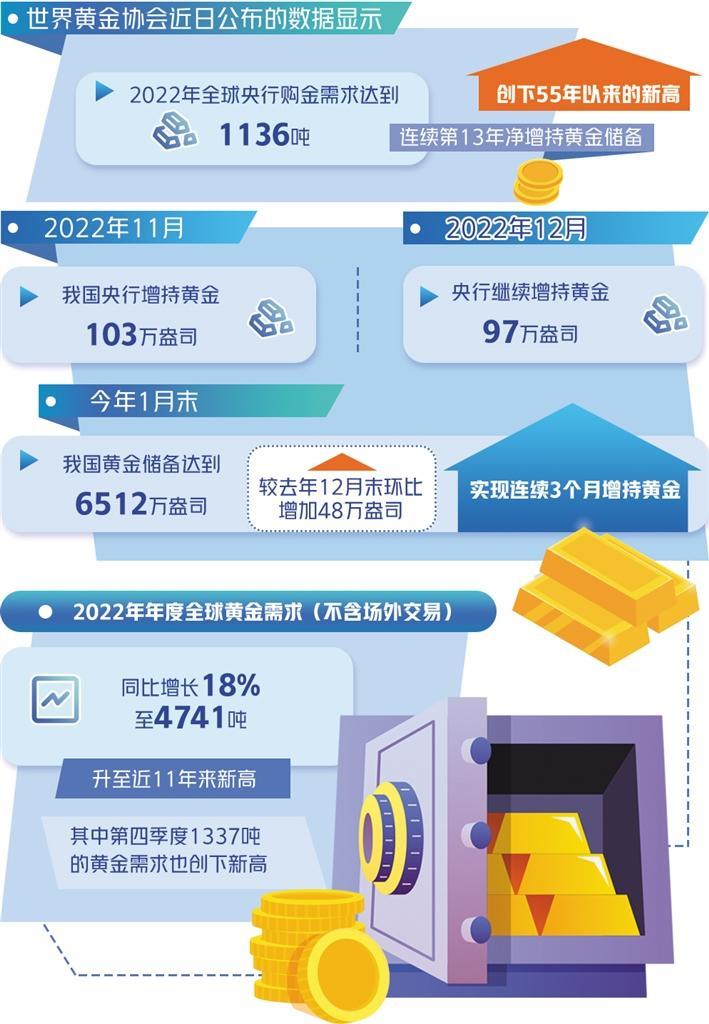For some time now, along with the continued rebound in the size of foreign exchange reserves, gold holdings have been rising month by month among our official reserve assets.
Data shows that in November 2022, our central bank increased its gold holdings by 1.03 million ounces. Prior to this, the country's gold reserves had remained at the level of 62.64 million ounces for three consecutive years since September 2019. in December 2022, the central bank continued to increase its gold holdings by 0.97 million ounces. At the end of January this year, China's gold reserves reached 65.12 million ounces, an increase of 480,000 ounces from the end of December last year, increasing its gold holdings for the third consecutive month to 2.48 million ounces. As a result, China's gold reserves were valued at US$125,283 million at the end of January, up US$8,048 million from US$117,235 million at the end of last year, attracting more attention.
Why did China increase its gold holdings for the third consecutive month? In the view of industry insiders, mainly by several factors: First, in view of the future global financial market volatility increased, China's relevant departments through the increase in gold holdings, can effectively reduce the magnitude of fluctuations in the size of foreign exchange reserves, to ensure that the amount of foreign exchange reserves stable fluctuations; Second, the international situation of changes in China's foreign exchange reserves to accelerate the pace of asset diversification allocation, as a traditional safe-haven class of assets and super-sovereign assets, gold can bring As a traditional safe-haven asset and a super-sovereign asset, gold can bring better asset protection; Third, as China's foreign exchange reserves continue to rise, the relevant departments also need to increase their holdings of gold, so that the proportion of gold remains at a relatively reasonable level.

"The main purpose of the Chinese central bank's continued increase in gold reserves is to optimize the structure of foreign exchange reserve assets, promote the diversification of foreign exchange reserve assets, and enhance the ability of foreign exchange reserve assets to withstand global financial market volatility and asset stability. As far as the global environment is concerned, the Fed's interest rate hike is nearing its end, the outlook for the US dollar is weak and uncertainty about the global political and economic situation is still high, which has to a certain extent enhanced the attractiveness of gold reserves." Zhou Maohua, macro researcher at Everbright Bank's Financial Markets Department, said.
Pang Ming, chief economist and research director of Jones Lang LaSalle Greater China, believes that gold has the multiple attributes of a financial and commodity and the advantages of safe-haven, anti-inflation, long-term value preservation and appreciation. Adding and dynamically adjusting gold reserves to the international reserve portfolio can adjust and optimise the overall risk-return characteristics of international reserves, diversify and rebalance international reserve assets, and help co-ordinate and maintain the safety, liquidity and profitability of international reserves. The central bank's increase in gold reserves by means of low allocation is an effective way to optimise the structure of reserve assets and hedge against the risk of depreciation of US dollar assets by market-based means.
In recent years, in the face of the volatile external environment, "gold hoarding" has become a common action of global central banks, gold asset allocation demand continues to expand. According to data recently released by the World Gold Council, global central bank demand for gold reached 1,136 tonnes in 2022, a record high in 55 years, and the 13th consecutive year of net increase in gold reserves. All along, the proportion of gold in the foreign exchange reserves of Western countries has always been more than 50%, and many emerging market countries have reached 8% to 10% of gold. According to incomplete statistics, as of the end of January this year, China's gold reserves accounted for only 3.93% of foreign exchange reserves, lower than many emerging market countries and Western countries.
Central banks are actively increasing their gold holdings mainly for the sake of avoiding credit currency risks and diversifying their reserve assets. In fact, Europe and the United States foreign exchange reserves in the gold reserves accounted for a relatively high, the cross-border circulation of European and American currencies to play a role in promoting. The industry believes that the global central banks to buy more gold, is by no means based on the short-term rise in gold prices profit, but from a more long-term perspective configuration gold. Specifically, one is to see gold in the global financial asset price volatility increased trend of hedge function, help reduce the size of foreign exchange reserves fluctuations, the second is due to the Russian-Ukrainian conflict continues, long-term inflationary pressure has increased, gold can also play a better anti-inflation and asset preservation function.
Looking ahead, industry insiders expect that the relevant departments in China will continue to hold more gold reserves in the future. After all, in the face of the increased risk of recession in Europe and the United States derived from the risk of violent fluctuations in financial markets, increased holdings of gold can better protect the size of China's foreign exchange reserves smooth fluctuations.
"The slowdown in the rate of increase in China's gold reserves in January 2023 compared to November and December 2022 may also be related to the recovery in gold prices. Under the influence of factors such as a weaker US dollar index and a slower pace of interest rate hikes by the Federal Reserve, the overall gold price is expected to maintain a strong trend and continue to oscillate upwards in the future." Pang Ming said that the current gold reserves in China's foreign exchange reserves is still very low, the total amount of gold reserves and China's economic volume and total foreign exchange reserves still do not match, and then take into account the financial security, reserve asset diversification and other aspects of demand, there is room to continue to increase gold holdings in the future.

